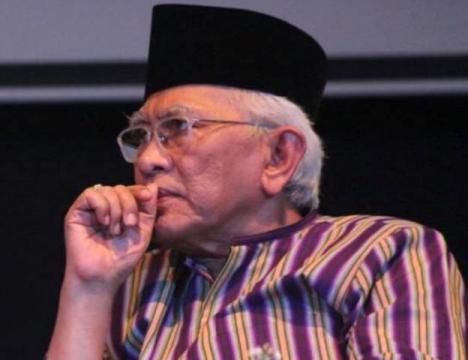Indonesia in need of Muslim cleric like Gus Mus
NU Online · Senin, 1 Januari 2018 | 17:22 WIB
Indonesia has made global headlines for the wrong reasons in recent years, with numerous foreign media outlets highlighting the fact that Islamic radicalism is gaining ground in the country, threatening to change its politics and forever alter the smiling face of the Indonesian Islam they once knew, The Jakarta Post reported.
Such a sinister outlook on the nation’s future is justified, particularly after the highly sectarian election in its capital, Jakarta. However, it is wrong to think Indonesia has lost all hope to retain (or regain) its title as a tolerant nation.
There is still hope for religious pluralism in Indonesia. That hope is embodied in a 73-year-old charismatic cleric and poet who won this year’s Yap Thiam Hien award: KH Mustofa “Gus Mus” Bisri.
The judges behind the award, who selected him from dozens of other worthy candidates, made the right call. The naming of Gus Mus, a Nahdlatul Ulama (NU) cleric, as recipient of the award could not be timelier.
It has sent the right message to the world that forces of religious tolerance remain alive and well in the country with the world’s largest Muslim population, and, more importantly, it serves as a reminder for other Muslim leaders and intellectuals about the need to spread tolerance the way Gus Mus — a modern Sufi poet — has done for years: with compassion and wisdom.
Gus Mus is no ordinary Muslim cleric. In his book, Religious Authority and the Prospects for Religious Pluralism in Indonesia, Muslim scholar Asfa Widiyanto differentiates Gus Mus and Muslim poet Emha Ainun Nadjib, or Cak Nun, from other Indonesian Muslim pluralists, particularly the younger thinkers who describe themselves, or are portrayed by other people, as “liberal.”
Using the concepts of “role,” “agency” and “authority” as analytical tools, Asfa argues that both Gus Mus and Cak Nun have what many pluralism advocates do not: an authority that has turned them into role models and sources of wisdom. The two, Asfa says, “have solid traditional credentials of religious authority, which serve as capital in gaining credibility from society.”
Gus Mus and Cak Nun have different backgrounds. Cak Nun is not officially affiliated to either NU or Muhammadiyah. He left a pesantren (Islamic boarding school) to complete his basic education at Muhammadiyah schools, and dropped out of Gadjah Mada University’s School of Economics.
Gus Mus, meanwhile, is a top NU cleric and completed his pesantren education before he acquired a degree in Islamic studies from the prestigious Al-Azhar University in Cairo in 1970.
Nevertheless, Gus Mus and Cak Nun are similar in that they are not ivory tower intellectuals. They directly engage with people, speak in their language and are comfortable with how millennials communicate (Gus Mus tweets through his handle: @gusmugusmu).
Certainly, Gus Mus and Cak Nun are not the only ones. In the past, Indonesia had Abdurrahman “Gus Dur” Wahid, who became Indonesia’s fourth president. Like Gus Mus, the late Gus Dur was a major proponent of the so-called pribumisasi Islam (the indigenization of Islam) movement, which attempts to translate the universal values of Islam into local idioms.
Within Muhammadiyah, one pluralism defender who is on par with Gus Mus in terms of influence and credibility is former chairman Ahmad Syafi’i Ma’arif, who won the Ramon Magsaysay award in 2008.
However, given his position, influence and strong Islamic background, Gus Mus serves as the perfect model of the Muslim pluralist that Indonesia needs, an example not only for Muslims in general but also for leading Muslim intellectuals who wish to fight the tide of extremism.
Gus Mus stands in stark contrast to many other pluralism proponents, particularly those linked to the Liberal Islam Network (JIL).
According to Asfa, the proponents of liberal Islam are unlikely to play a strategic role in promoting pluralism for three simple reasons: They do not have “any strong basis at the grass roots level,” their messages are seen as “sophisticated and elitist” and they have been stigmatized as “illegitimate.”
Meanwhile, he went on, other Muslim intellectuals who describe themselves as “moderate” have done nothing but preach to the choir by holding numerous interfaith dialogues involving other moderate groups.
Gus Mus may not be the smartest Muslim intellectual in Indonesia, which has already had a thinker as brilliant as Nurcholish “Cak Nur” Madjid, but he is arguably one of the most effective in bringing civic values to Muslim society.
In a telling example of how Gus Mus works, in 2002, the cleric wrote an opinion piece criticizing not the substance of JIL founder Ulil Abshar Abdalla’s provocative piece about the need for rejuvenation of Islamic thoughts but the way he conveyed his message, suggesting that his son-in-law had been driven by anger when he wrote the piece that infuriated many Muslims.
Alas, the problem with Indonesia today is not that it is experiencing a deficit of bright and erudite Muslim scholars who can devise a theological basis for religious pluralism. It is basically running short of role models or figures of authority that can translate the virtues of pluralism in everyday language.
In other words, the country lacks figures like Gus Mus, an influential ulema who could teach the basic principles of Islamic tolerance to lay people without having to force them to swallow all the big words about pluralism.
Indeed, at a time when many people look to some angry Muslim televangelists for life guidance, there is no question that we need more people like Gus Mus to counter their often sectarian, exclusivist and hateful narratives. (Masdar)
Terpopuler
1
Keluar Mani yang Tidak dan Membatalkan Puasa
2
Khutbah Jumat: Ramadhan dan Kesempatan yang Tidak Selalu Terulang
3
Khutbah Jumat: Ramadhan, Melatih Sabar, Memperkuat Syukur
4
Khutbah Jumat: Tiga Kebahagiaan Orang Puasa
5
Kultum Ramadhan: Keutamaan Tarawih dan Witir
6
Khutbah Jumat: 4 Cara Menghidupkan Malam Ramadhan dengan Ibadah
Terkini
Lihat Semua
















